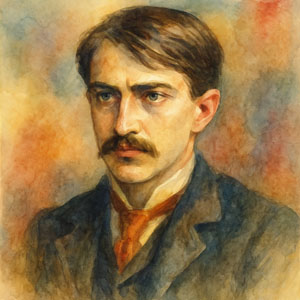Sir, I exist!
However, replied the universe,
The fact has not created in me
A sense of obligation.” — Stephen Crane
 Born on this day in Newark, New Jersey, American poet and short-story writer Stephen Townley Crane (1871–1900) was the fourteenth child of a Methodist minister. He published his first story at fourteen and, through his writing, gave voice to the fragile courage of being alive.
Born on this day in Newark, New Jersey, American poet and short-story writer Stephen Townley Crane (1871–1900) was the fourteenth child of a Methodist minister. He published his first story at fourteen and, through his writing, gave voice to the fragile courage of being alive.
“Sir, I exist!” he wrote to the universe, insisting that even a single human spark matters in the face of vast silence. Crane’s work carried this heartbeat, a clear-eyed compassion for the lost, the ordinary, the misunderstood.
“A high cold star on a winter’s night is the word he feels… Thereafter he knows the pathos of his situation,” he wrote. By his early death at twenty-eight from tuberculosis, Crane had produced more than one hundred stories and two volumes of poetry.
His vision was stripped of pretense — “Every sin is the result of a collaboration,” he warned in The Blue Hotel (1898). His words carried an honesty that refused to look away.
Best known for The Red Badge of Courage (1895), Crane followed a young Union soldier confronting death, fear, and the first flicker of heroism. “He had been to touch the great death,” Crane wrote, “and found that, after all, it was but the great death. He was a man.”
Joseph Conrad called the novel “one of the most enduring memories of my literary life,” and H. L. Mencken praised it as “a flash of lightning out of a clear winter sky.”
A year before his death, Crane wrote with irony and tenderness in experimental free verse: “War is kind. Do not weep.” Even then, his words reached toward mercy.
His brief life glows still, proof that even a single voice can echo against eternity and be heard.
 Affirm your being. Your silent heart hears.🌟
Affirm your being. Your silent heart hears.🌟
